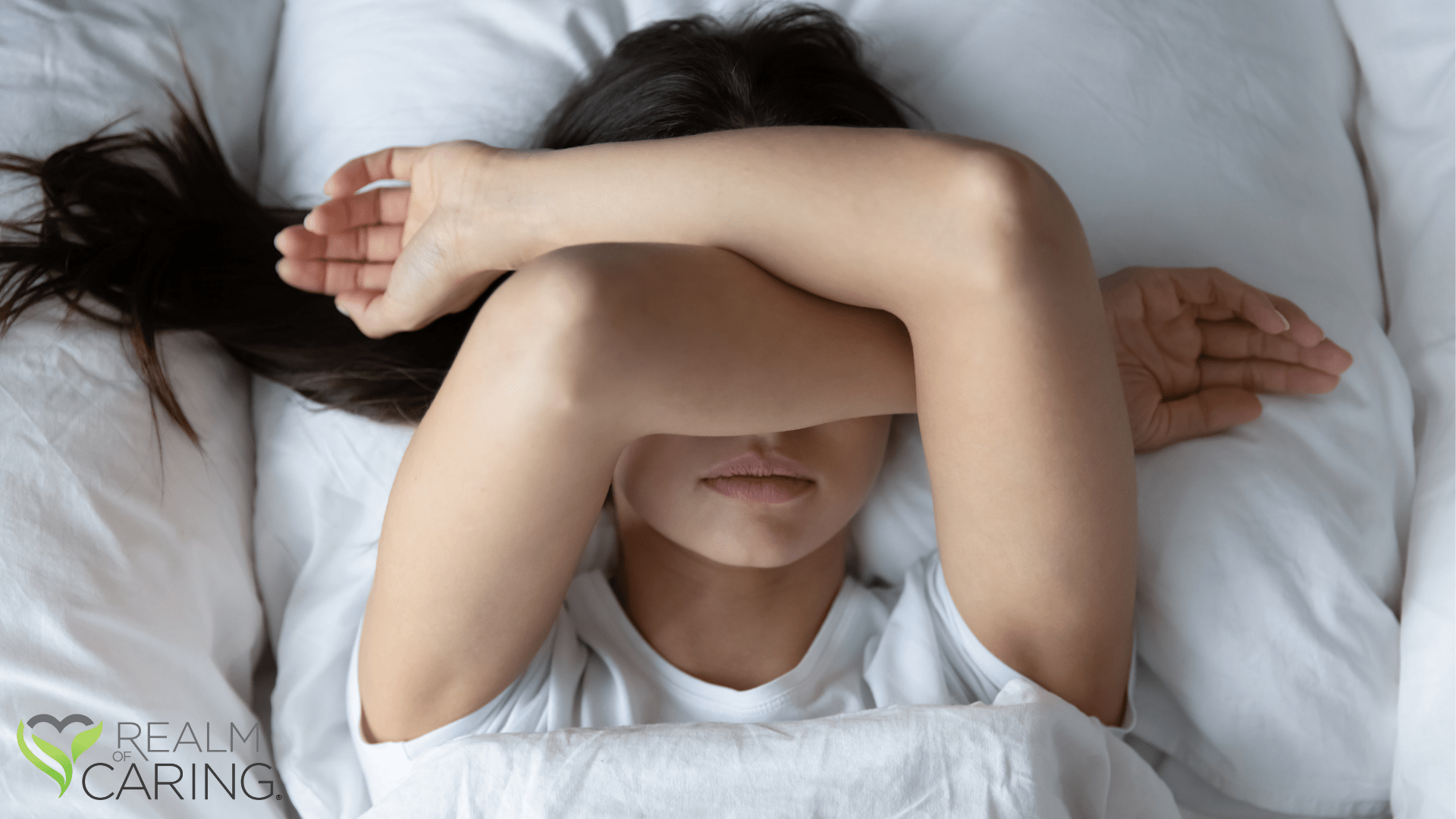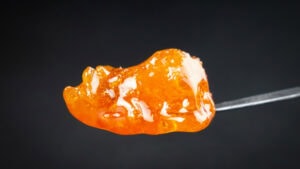Many clients come to Realm of Caring looking for help in improving their quality of sleep. The great news is that research is continuing to show us that cannabinoid therapy may help. Certain cannabinoids have shown through studies the ability to benefit our sleep-wake cycles, decrease nightmares, lessen the conditions that interfere with our sleep, and assist in actually falling asleep. Depending on what sleep disorder one is suffering with, or what sleep benefit they are looking for, there are 3 main cannabinoids that have been studied for their sleep-enhancing qualities. Those cannabinoids to be discussed here are CBD, THC, and CBN.
Before we go on, let’s get into some background information and understanding.
Circadian rhythm is our biological rhythm in a 24-hour period, coming from the latin circa meaning around and dies meaning day. The most commonly known is the sleep-wake cycle, which in chronobiology, is tied to day and night or lightness and darkness. When our circadian rhythms are properly aligned and consistent, we can experience true restorative sleep.
Insomnia is recognized by the American Psychiatric Association as the most common sleep disorder, involving problems getting to sleep or staying asleep with symptoms being episodic, persistent, and/or recurrent. The many types of insomnia are known to cause daytime tiredness, distress, irritability and/or impairment.
Our Endocannabinoid System (ECS) is composed of endocannabinoids, as well as two distinct receptors known as CB1 and CB2, and enzymes responsible for the metabolism of endocannabinoids. It has been found that the expression pattern of CB1 and CB2 receptors are influenced by light-dark cycles and therefore appear to align with circadian rhythms. Furthermore, it has been shown in studies with rodents that the ECS may potentially modulate those rhythms to promote sleep.
CBD Benefits
CBD is not a naturally sedative molecule. Research has shown that high quantities may have “sedative-like qualities”, potentially due to the effect on cortisol levels. So why is it that you might have heard from a friend that CBD helps them sleep?
There are two great reasons for this.
CBD has therapeutic properties that have the potential to mitigate symptoms that interfere with sleep. It also has the potential to improve sleep-wake cycles leading to an increase in the percentage of total sleep overtime.
Among the several researched properties, CBD may benefit as an anxiolytic, anti-inflammatory, and analgesic. The anxiolytic properties of CBD may help to improve sleep by mitigating anxiety or stress-induced insomnia. Stress induces a sleep-related feature known as rapid eye movement (or REM) sleep rebound, this is an increase in REM sleep during the nightly sleep cycles. People experiencing REM sleep rebound may spend more time in REM than they would during a night of normal, healthy sleep.
Inflammation is a root cause of autoimmune disorders including arthritis, diabetes, irritable bowel syndrome (IBS), crohn’s disease, and others – all which have an effect on body clock function that can lead to sleep disorders. A study by Northwestern found in mice this link between inflammation and what controls the body clock. By limiting this inflammation, we may lessen the effects on our body clock functions and have more restful sleep.
A study in 2005 showed that people reporting insomnia symptoms are at least 3 times more likely to have a chronic painful physical condition. These events may then become cyclical in that pain may disrupt sleep and sleep deprivation can increase pain perception. In the majority of animal studies, CBD has been known to exert analgesic effects; co-administering with THC may provide more benefit to this therapeutic action.
Our circadian rhythm aligns our sleep and wakefulness with day and night to provide stability in restorative rest that enables increased daytime activity. Low doses of CBD may be associated with wakefulness to help our focus and cognition during the day. Studies show that therapeutic levels of CBD administration may increase total sleep time and decrease frequency of arousals at night – leading to an increase in total percentage of sleep overtime.
THC Benefits
In comparison to CBD, THC has shown in studies as having an affect on mental and physical sedation, even in low amounts. THC also has positive therapeutic benefits that may lead to better sleep.
Nightmares are associated with post-traumatic stress disorder (PTSD) often resulting in this being considered a “treatment-resistant” condition. Initial research has shown the benefit cannabinoids can have in managing nightmares linked with PTSD. A study with military veterans and prison inmates receiving Nabilone, a synthetic form of THC, found a reduction in nightmare presence and intensity. This increased participants’ hours of sleep per night.
Just as mentioned with CBD, THC is also beneficial for mitigating pain-induced insomnia or wakefulness. When it comes to pain studies and medical cannabis with significant THC content, benefits consistently show moderate to high symptom management of chronic pain.
A normal amount of apneic events in a healthy individual is about 4 per hour while asleep. Sleep apnea is the most prevalent form of sleep-disordered breathing in the United States and a number of animal and human studies have been conducted to examine cannabinoids as potential therapeutic alternatives to continued positive airway pressure (CPAP) machines, which are currently being utilized.
THC shares properties of the endocannabinoid Oleamide, which benefits apneic events. Results in one animal study showed that both the endocannabinoid Oleamide and the exogenous cannabinoid THC reduced apneic events, suggesting therapeutic promise for those who suffer with sleep apnea.
CBN and sleep
If you are new to CBN, this is a cannabinoid that is created as THC ages.
It has been observed that there is a correlation between aged cannabis and sleepiness, therefore CBN was previously linked to sedation. However, there may be more to it than the CBN itself. What limited research there is, has shown that CBN alone does not provide sedating effects. However, the combination of THC and CBN has been researched to promote sleepiness.
What also may be adding to the sleepiness as a result of taking CBN, are the sesquiterpenes that are left behind as cannabis ages. These may be naturally more calming than the monoterpenes that evaporate overtime. Neurologist Ethan Russo explains that in aged cannabis, monoterpenes begin evaporating after the live plant is cut from its growing medium as they are lighter in weight. Pinene is a monoterpene example. Once monoterpenes have evaporated, sesquiterpenes are left behind due to being heavier in weight. These terpenes are naturally more calming, such as nerolidol and caryophyllene oxide.
As well, just as with CBD and THC, CBN has its own therapeutic benefits. For example, in a rodent study, CBN was shown to reduce arthritis-related inflammation.
There is a lot to consider when starting cannabinoid therapy but, as always, a Realm of Caring care specialist is here to help with your questions. Contact us today by calling (719) 347-5400 or by emailing info@realmofcaring.org.
◾
Disclaimer
The Realm of Caring Foundation specifically invokes the first amendment rights of freedom of speech and of the press without prejudice. These statements have not been evaluated by the food and drug administration. the products discussed are not intended to diagnose, cure, prevent or treat any disease. Realm of Caring always recommends when and wherever possible that licensed local healthcare professionals be consulted.
The Realm of Caring Foundation is an independent nonprofit with its own governing board. We do not produce or sell cannabinoid products, nor do we receive funds from the sale of other company’s products.







